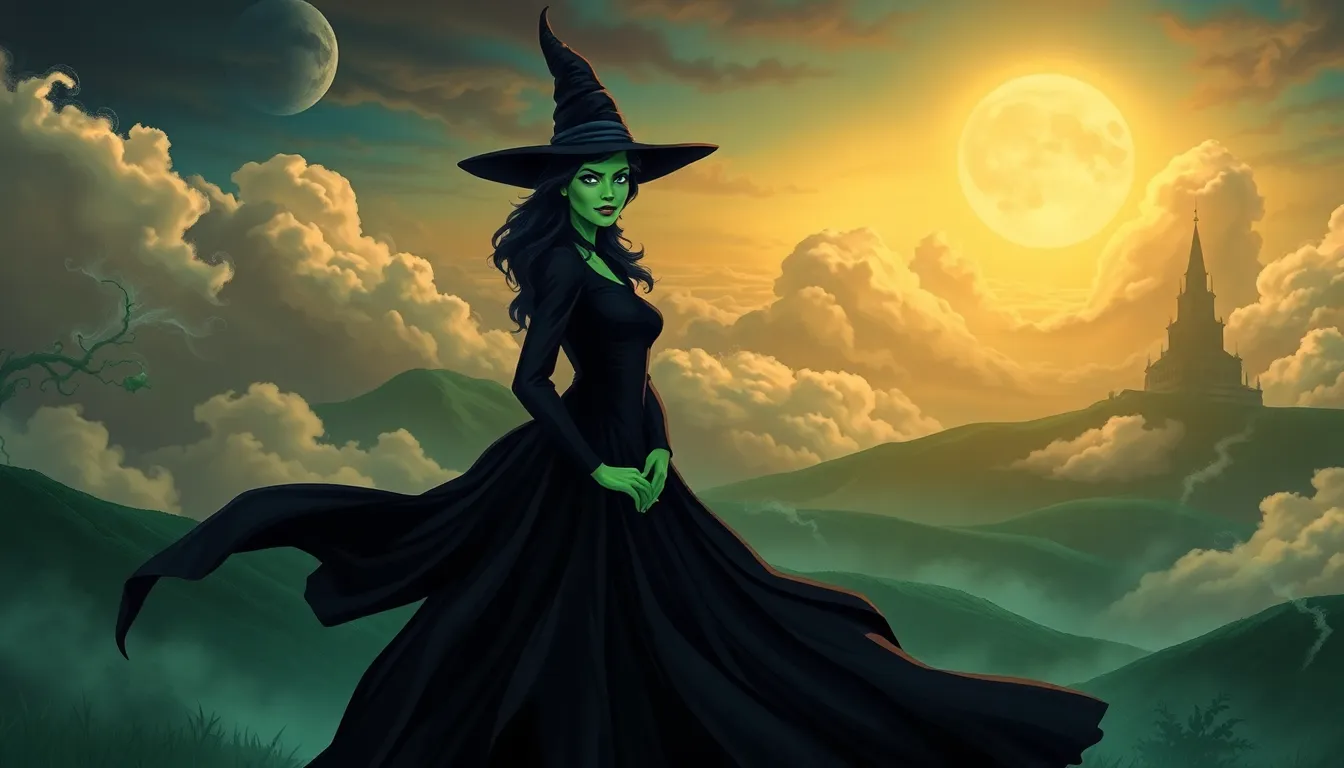Table of Contents
ToggleIn the world of musical theater, few songs capture the essence of a character’s journey like “No One Mourns the Wicked.” This powerful number from Wicked sets the stage for a tale of friendship, ambition, and the complexities of good versus evil. As the opening song, it introduces audiences to the vibrant land of Oz and the controversial figure of Elphaba, the Wicked Witch of the West.
The lyrics weave a narrative that challenges traditional perceptions of morality, prompting listeners to reflect on the consequences of choices and societal judgments. With its catchy melody and thought-provoking themes, “No One Mourns the Wicked” resonates with fans, making it a memorable entry point into the beloved musical. Exploring the lyrics reveals deeper meanings and connections that enrich the overall experience of the story.
Overview of No One Mourns the Wicked
The song “No One Mourns the Wicked” serves as the energetic opening number of the musical Wicked. It introduces Elphaba, the Wicked Witch of the West, establishing her complex character and the overarching narrative. The lyrics delve into themes of morality, emphasizing the ambiguity of good and evil.
The song’s structure features a lively melody that captivates listeners while presenting thought-provoking ideas. The lyrics challenge conventional views on morality, prompting audiences to reflect on their perceptions of judgment and consequence. The ensemble of characters contributes to the richness of the song, as each line reveals societal attitudes towards Elphaba and her eventual fate.
The themes of friendship and ambition are also woven throughout the lyrics. They highlight the underlying motivations of the characters and set the stage for their evolving relationships. These elements create a resonant experience for fans, enhancing their connection to the story and the musical’s message.
Themes in the Lyrics

The lyrics of “No One Mourns the Wicked” convey several significant themes, exploring complex moral landscapes and the implications of one’s actions.
Exploring Good vs. Evil
The song presents a nuanced examination of good and evil. It challenges conventional definitions, illustrating that moral clarity often blurs. The lyrics highlight Elphaba’s character, framed as a misunderstood figure rather than a clear villain. Lines that emphasize public perception versus personal truth invite listeners to confront their biases and reassess what defines morality. The song underscores the theme that societal judgments might reflect more about the judges than the judged, encouraging reflection on the complexity of human nature.
The Concept of Legacy
Legacy plays a pivotal role in the song’s narrative. The lyrics depict how actions shape perceptions and influence long-term reputations. It addresses the idea that people’s legacies, particularly those deemed “wicked,” are subject to interpretation and often determined by those in power. The repeated assertion that “no one mourns the wicked” illustrates a stark truth: societal accolades may favor the righteous while condemning those who deviate from accepted norms. This theme sparks contemplation about the lasting impact of individual choices on one’s legacy and the way history remembers figures who challenge the status quo.
Musical Composition
Musical composition plays a critical role in “No One Mourns the Wicked,” enhancing the song’s narrative and emotional impact. The intricate interplay of melody, harmony, and rhythm creates an engaging experience for the audience.
Melodic Elements
Melodic elements feature a lively and dynamic structure, captivating listeners from the start. The song employs a major key signature, contributing to its upbeat feel while allowing for moments of tension that reflect character complexities. Syncopated rhythms, particularly in vocal lines, add excitement and drive, while the use of repeated motifs emphasizes key themes. Harmonically, the song transitions between bold, bright chords and more subdued progressions, mirroring the tension between perceived good and evil. The strong orchestral accompaniment supports the vocal arrangements, creating a full sound that immerses the audience in the story’s context.
Lyric Delivery
Lyric delivery showcases a blend of theatricality and emotion, with performers using powerful vocal techniques to convey character motivations. The ensemble sections create a rich tapestry of voices, reflecting societal opinions on Elphaba. Phrasing varies throughout, with shifts from rapid-fire delivery in energetic passages to slower, more contemplative moments, emphasizing significant lyrics. Each character’s unique vocal style contributes to the overall narrative, allowing individual perspectives to shine. The delivery captures the urgency and complexity of the song’s themes, provoking thought regarding moral ambiguity and societal judgments.
Impact on Musical Theatre
The song “No One Mourns the Wicked” significantly influences musical theatre through its innovative approach to storytelling and character development. It introduces themes of morality and legacy, challenging traditional narratives within the genre. The complex portrayal of Elphaba redefines the archetype of the villain, resonating with audiences who appreciate depth in character alignment and moral complexity.
The song has paved the way for future musicals to confront ambiguous moral landscapes, encouraging creators to explore themes beyond clear distinctions of good versus evil. This approach resonates with the public, fostering discussion and encouraging a reevaluation of character motivations and societal judgments.
Incorporating lively melodies and dynamic instrumentation, “No One Mourns the Wicked” engages audiences immediately, setting a high standard for opening numbers. The song showcases ensemble work, reinforcing the importance of community voices in storytelling. It highlights how collective perspectives shape individual legacies, altering how audiences perceive characters throughout a musical’s narrative.
By combining strong lyrical content with theatrical performance, the song elevates emotional expression in musical theatre. Performers employ powerful vocal techniques to convey urgency and complexity, inviting the audience to reflect on broader themes of acceptance and bias. This duality—merging entertainment with thought-provoking content—helps solidify its impact on the evolution of musical theatre.
Overall, “No One Mourns the Wicked” serves as a benchmark for addressing complex themes in musical storytelling, enhancing the depth and richness of the theatre experience. Its lasting influence encourages future productions to push boundaries, ensuring that characters and narratives evolve in response to audience engagement and societal change.
Personal Reflection on the Lyrics
The lyrics of “No One Mourns the Wicked” resonate deeply, challenging audiences to confront complexities in morality. They frame Elphaba as a character shaped by societal judgments rather than inherent wickedness. This perspective prompts reflections on one’s biases about good and evil.
The statement “no one mourns the wicked” serves as a powerful commentary on legacy. It suggests that public perception often paints a simplistic picture of individuals based on their choices. This realization encourages listeners to evaluate how actions define reputations.
The song’s dynamic composition enhances emotional connections. The lively melody coupled with powerful vocal performances captures the urgency of its themes. The syncopated rhythms reflect the tension inherent in Elphaba’s story, fostering an environment for self-reflection.
The ensemble’s varying phrasings echo societal attitudes toward Elphaba, highlighting the collective voice’s role in shaping narratives. The blend of theatricality and rich vocal layers emphasizes the complexity of perceived morality.
Ultimately, the lyrics invite contemplation about the nature of goodness and legacy, urging audiences to examine their interpretations of Elphaba’s character. The musicality intertwined with the profound themes elevates “No One Mourns the Wicked” beyond entertainment, engaging listeners intellectually and emotionally.
The lyrics of “No One Mourns the Wicked” resonate far beyond the confines of a musical stage. They challenge audiences to reflect on the complexities of morality and the impact of societal perceptions. By framing Elphaba not as a villain but as a misunderstood figure, the song invites deeper contemplation on the nature of good and evil.
Its lively composition and powerful performances enhance the emotional weight of the narrative, leaving a lasting impression on listeners. As the opening number of Wicked, it sets a high standard for storytelling in musical theatre, encouraging future works to explore similar themes of ambiguity and legacy. Ultimately, this song underscores the importance of examining one’s own biases while engaging with the intricate tapestry of human experience.







